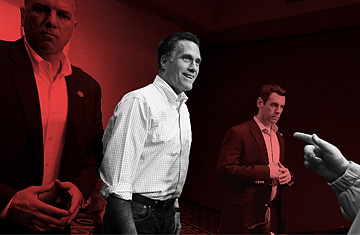
Here's some advice for Mitt Romney: Tack to the political center. Actually, no: Fire up your conservative base. Talk more about your agenda. Or maybe talk more about yourself. Loosen up! But avoid gaffes at all costs. Own your Mormonism. On second thought, conceal your Mormonism. Shake the Etch A Sketch on immigration. But stay consistent and don't flip-flop. You can only win by picking Marco Rubio as your Veep--unless Rubio's too green. And try dressing more casually. But whatever you do, don't focus-group your wardrobe.
Every pundit, politico and GOP player has an opinion about what Mitt needs to do to win. But while it's a fun game for outsiders to play (the tips above reflect the real advice of various columnists and operatives), it drives the people who actually run campaigns crazy. One Romney adviser calls them the Uncle Leos, after a memorably intrusive relative who wouldn't leave Jerry Seinfeld alone. "Kibitzing," says Jim Jordan, who managed part of John Kerry's 2004 campaign, "may be the hardest thing for any campaign manager to handle."
That can be a test of both sanity and discipline. "It's a massive cacophony of noise coming at you, from the network news to the newspapers, radio, cable, all the commentators, the high-end donors, to the friends and family of the candidate," says Steve Schmidt, who managed John McCain's 2008 run. "It's important to have the focus to manage the information flow to sort out what's important and what's not."
Mostly, say the pros, outside advice just isn't worth much. When a columnist writes an open memo or a millionaire donor whispers in the candidate's ear at a $32,000-a-head dinner, the advice isn't informed by thorough polling or knowledge of the candidate's long-term strategic plan. Often the kibitzer is covering ground that's been well trodden during internal strategy sessions (or on cable TV, for that matter) and rejected for good reason. "It's just an odd profession," Jordan says, "in that anyone who's successful in any field--or anyone with a blog--thinks they can run a presidential campaign [better] than the guys who actually have decades of experience in politics."
Of course, the pros also often get it wrong. That's why a few keep their ears open. "There's some nuggets out there," Scott Reed, manager of Bob Dole's 1996 campaign, insists. Asked whether he can recall acting on a specific suggestion from a pundit, donor or other distant but well-meaning ally, however, Reed draws a blank. "Normally, the things you hear on TV are 'The campaign needs to be bold.' And it's like, Well, define bold for me and tell me how to implement that," he says.
It's important that a campaign demonstrate a listening ear, Reed says. And it's true that in politics, you sometimes have to treat people you intend to ignore as if they're clairvoyants. But that comes at a cost: wasting time talking with donors and other chatty VIPs, for instance, or watching TV talking heads--whom campaign insiders seem to resent and obsess over in equal measure. (Nor can campaigns resist hostile criticism. At one point in the HBO movie Game Change, Schmidt admonishes McCain to "stop watching Olbermann.")
